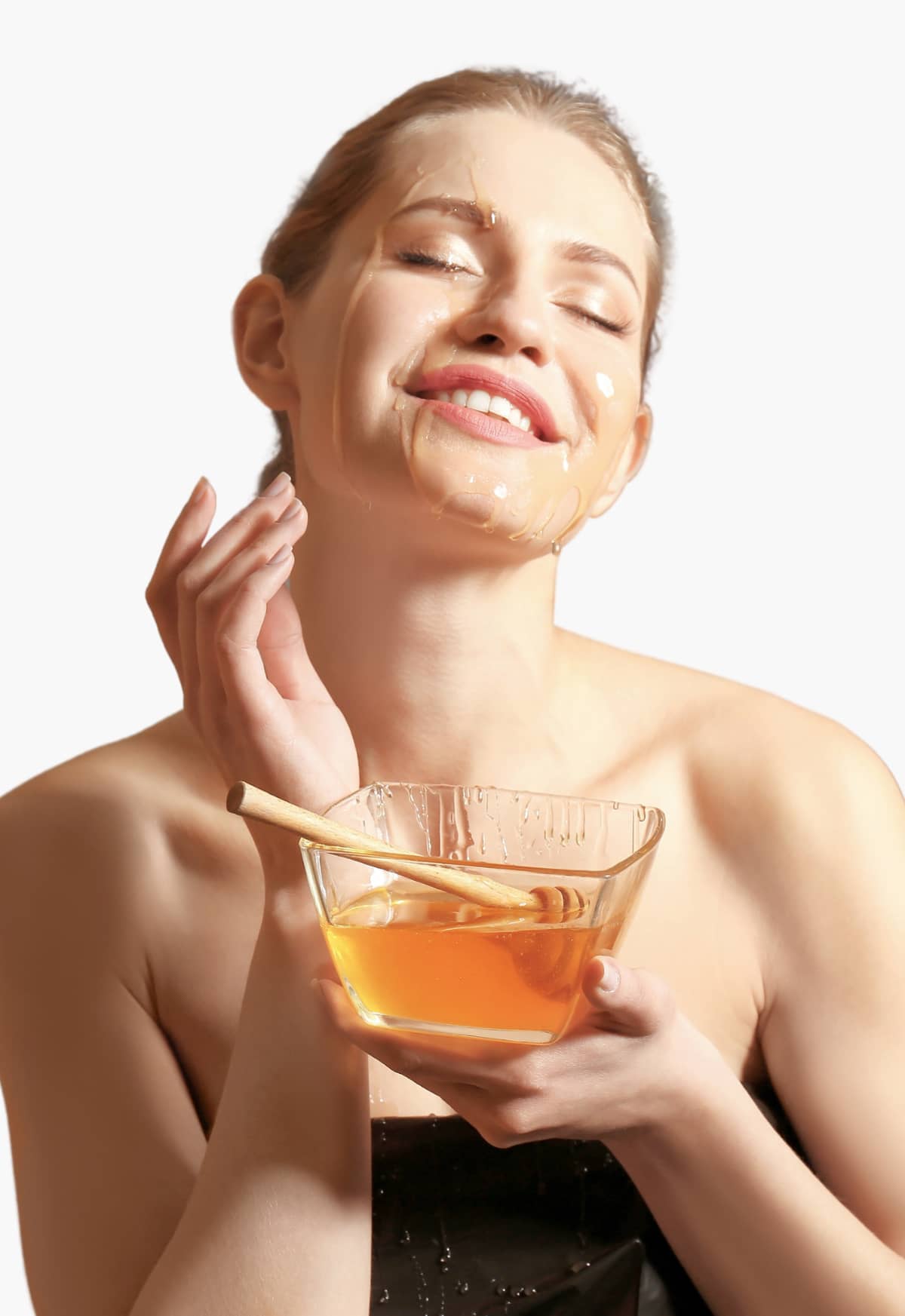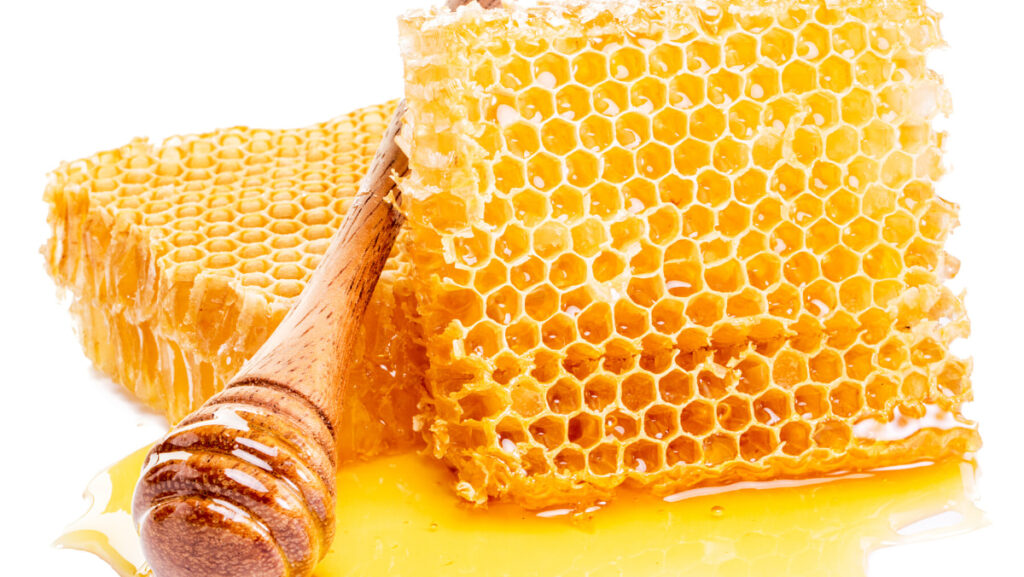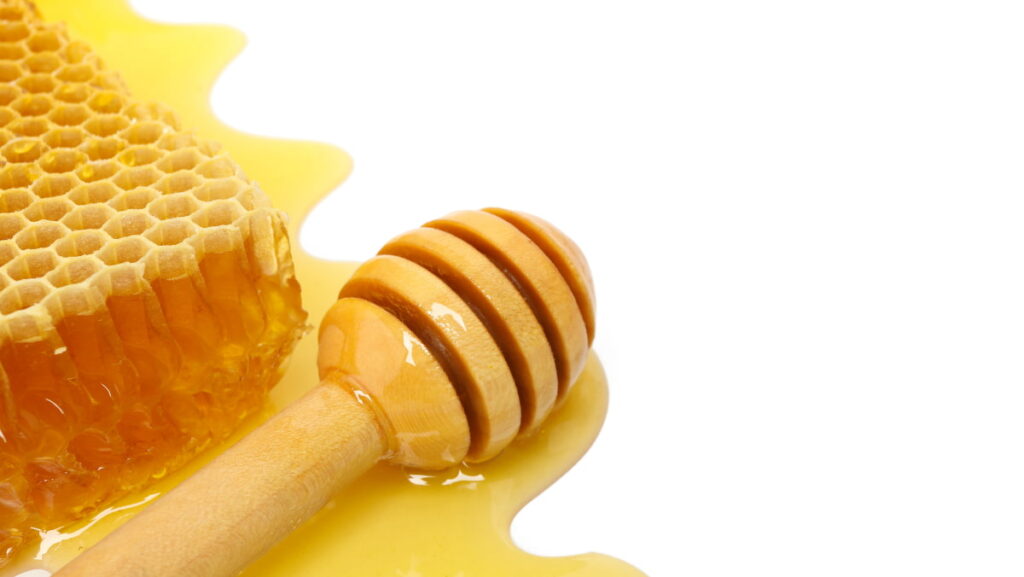
Nature has proven to be the Sephora of natural wonders for the skin. One ancient secret ingredient for a glowing complexion has recently sparked the interest of many beauty enthusiasts. It’s none other than the golden elixir – honey.
Rich in antioxidants and blessed with antibacterial properties, honey has been an essential part of beauty routines for centuries.
You’d be fascinated to know that honey doesn’t just enhance your skin’s natural glow; it is also a powerful remedy. The benefits of honey for the skin cover a wide range of skin concerns.
Whether you’re dealing with acne or aging, honey is a versatile ally. It’s been used as a skin-soothing agent since ancient times, recognized for its potential to hydrate and soften the skin. But that isn’t all. Honey can also accelerate your cells’ healing process!
So, exactly, what does honey do for the skin, and how does it accomplish all of that?
Don’t worry; answers will be filing in shortly. Stay tuned to learn more about the incredible benefits of honey for the skin.
Is Honey Good For Your Skin
Indeed, honey holds a host of benefits for the skin, making it a natural treasure in the realm of skincare. Its multifaceted composition contributes to its reputation as a skin-loving ingredient:
- Simple Sugars: Honey contains simple sugars such as fructose and glucose, which possess the remarkable ability to attract and retain moisture. This innate capacity helps lock in hydration, leaving your complexion plump and supple.
- Proteins and Amino Acids: The presence of proteins and amino acids further enriches honey’s skincare prowess. Amino acids, in particular, extend their moisturizing effects, ensuring the skin remains nourished and replenished.
- Vitamins: Honey boasts a range of vitamins, including the rejuvenating vitamin B and the skin-brightening vitamin C. These vitamins collaborate to enhance the skin’s vibrancy and health.
- Enzymes: Enzymes in honey contribute to its exfoliating properties, gently buffing away dead skin cells and promoting a smoother complexion.
- Minerals: An array of minerals like potassium, magnesium, and phosphorus reinforces honey’s role in maintaining a radiant complexion. These minerals play a pivotal part in supporting the skin’s overall health.

What Does Honey Do For Your Skin
All right, so this natural elixir has an impressive profile. This is essentially the backbone for the benefits of honey for the skin.
However, before we dive right into the benefits, we will do a backpedal to understand where they can be attributed – the incredible properties of honey!
So let’s take a closer look at what honey does for your skin:
- Antimicrobial Properties:
- Certain varieties of honey exhibit potent antimicrobial effects.
- Some types of honey, including Manuka honey, have demonstrated efficacy against challenging bacteria like MRSA.
- Anti-Inflammatory Benefits:
- Honey can soothe inflammation and regulate the skin’s immune response.
- Its anti-inflammatory properties can contribute to calming redness and irritation.
- Emollient and Humectant:
- Honey acts as an emollient, effectively softening and smoothing the skin’s texture.
- Its humectant nature draws moisture from the environment, helping to keep the skin hydrated.
- Regulation of Skin’s pH:
- Honey helps to balance the skin’s pH levels, promoting a healthy and harmonious environment.
- This pH regulation contributes to maintaining the skin’s natural protective barrier.
If you are looking at your jar of honey in disbelief, you shouldn’t. To be fair, some variations of honey are considered superior for their health benefits. These include:
- Manuka Honey: Revered for its potent antibacterial properties, Manuka honey is derived from the nectar of the Manuka tree’s flowers. Its unique antibacterial component, known as methylglyoxal (MGO), sets it apart, making it sought after for wound healing and skincare.
- Kanuka Honey: Hailing from the same family as Manuka honey, Kanuka honey also carries notable antibacterial properties. It’s esteemed for its potential to combat various skin issues, offering a natural solution for blemishes and irritation.
- Acacia Honey: Acacia honey, with its light and delicate flavor, is rich in antioxidants. Its gentle nature makes it suitable for soothing sensitive skin and promoting a balanced complexion.
- Buckwheat Honey: Buckwheat honey, characterized by its dark hue and robust taste, is known for its high antioxidant content. Its potential to support skin health is attributed to its antimicrobial and anti-inflammatory properties.
- Royal Jelly Honey: Derived from the secretion of worker bees, royal jelly is nutrient-dense and often mixed with honey. This blend is cherished for its potential to nourish the skin from within, offering a holistic approach to skincare.
Benefits Of Honey For The Skin
You’ve probably enjoyed honey’s sweet taste in your tea or breakfast concoctions. Yet, the benefits of honey for the skin are just as delicious as its taste.
Dermatologists and beauty veterans alike preach on the bountiful skin improvements honey provides, underscoring its timeless popularity in the skincare world.
Without further due, let’s uncover seven benefits of honey for the skin + 1 bonus:
1. Honey Keeps Your Skin Moisturized
Talk about a natural humidity magnet; honey’s just that! Honey emerges as a natural powerhouse for maintaining skin moisture.
Acting as both an emollient and a humectant, it creates a protective barrier on the skin’s surface, preventing moisture loss and locking hydration within.
Its humectant properties draw water from the atmosphere into the surface layers, further bolstering its ability to keep the face supple and well-nourished.
These attributes make honey a sought-after ingredient, especially for those seeking an effective natural moisturizer.
2. Honey Is A Softs Cleanser And Exfoliator
In addition to its hydrating prowess, honey showcases gentle cleansing and exfoliating attributes. Its enzymes work harmoniously to delicately cleanse the skin by breaking down dirt, oil, and makeup residues without disturbing the skin’s natural balance.
The slight exfoliating action of honey sloughs away dead skin cells, revealing a smoother and more radiant complexion. This makes it an excellent choice for those desiring a thorough yet gentle cleansing ritual.
3. Honey May Treat Dermatitis, Psoriasis, and Rosacea
Scientific exploration hints at honey’s potential to address inflammatory skin conditions like dermatitis, psoriasis, and rosacea.
Honey’s immune-modulatory effects are believed to help regulate the skin’s immune response, potentially mitigating the symptoms of these conditions.
Kanuka honey from New Zealand has exhibited remarkable results in managing rosacea, providing relief to those dealing with this challenging skin concern.
Honey’s inherent antimicrobial properties add to the benefits of honey for these inflammatory skin conditions. They serve as a safeguard against secondary infections that can exacerbate them.
4. Honey Can Treat Various Skin Infections
Honey’s antimicrobial attributes extend beyond its role in inflammatory conditions to embrace the realm of skin infections.
From athlete’s foot to minor cuts and wounds, honey’s natural ability to inhibit the growth of bacteria and microbes can aid in preventing infections and facilitating the healing process.
This traditional use of honey for wound care finds support in modern research, highlighting its potential as an alternative approach to maintaining skin health.
5. Honey Is Perfect For Sensitive Skin and After-sun Care
For individuals with sensitive skin prone to irritation, honey’s gentle nature provides a soothing balm. Its anti-inflammatory properties help calm redness and reduce discomfort, making it a trusted choice for those seeking relief.
Moreover, honey’s hydrating qualities offer a natural solution for after-sun care. The skin-soothing effects of honey can alleviate sunburn’s discomfort and aid in replenishing lost moisture after sun exposure.
6. Honey Is An Anti-Aging Elixir
Look out, wrinkles; honey’s making a statement! Honey’s antioxidant-rich composition contributes to its potential as an anti-aging elixir.
Antioxidants neutralize free radicals, the molecules responsible for premature aging and cellular damage.
By combating free radicals, honey assists in preserving the skin’s youthful appearance. Its natural moisturizing and rejuvenating properties also help maintain skin elasticity, reducing the appearance of fine lines and wrinkles.
| Substance in Honey | Benefit for Skin |
| Antioxidants | Fighting off free radicals that lead to skin aging |
| Humectants | Hydrating the skin and reducing the appearance of wrinkles |
7. Honey May Fend Off Acne
Who enjoys a skin breakout? No one, right? There is not sufficient evidence listing honey as an acne remedy. Yet, due to its exceptional properties, you can find honey formulated into many anti-acne products.
Honey’s antibacterial properties present an intriguing potential for addressing acne concerns. Its ability to inhibit the growth of acne-causing bacteria offers a natural approach to preventing breakouts.
Honey’s anti-inflammatory nature also assists in reducing redness and swelling associated with acne. When applied as a spot treatment or incorporated into skincare routines, honey may contribute to a clearer complexion.
Bonus: Honey For Hair Health
Beyond skincare, honey extends its benefits to hair health. Its remarkable ability to penetrate deep within hair shafts makes it a valuable addition to haircare routines.
Honey’s restorative qualities help repair and strengthen hair, enhancing elasticity and flexibility. Its natural humectant nature also assists in maintaining optimal moisture levels in the hair, contributing to overall hair health and vibrancy.
The table below summarizes some of the main benefits of honey for the skin:
| Skin Benefit | How Honey Helps |
| Moister Retention | Natural humectant — Draws and locks in moisture |
| Anti-Aging | Full of antioxidants — Fights off free radicals |
| Anti-Blemish | Natural antibacterial — Reduces acne and pimples |
| Sunburn Soother | Anti-inflammatory — Replenishes lost hydration |
Potential Side Effects Of Honey
When using honey on the face, there are potential side effects that you should consider:
1. Allergic reactions: As with any product or ingredient, it is possible to have an allergic reaction to honey. If you are prone to allergies or have sensitive skin, it is best to test a small area of your skin before applying honey all over your face.
2. Skin irritation: Honey can be quite sticky, and this can cause some irritation if left on for too long. Be sure to rinse off the honey after a few minutes and moisturize afterward.
3. Breakouts: Although honey can be beneficial for acne-prone skin, it is also possible that it could cause breakouts in some cases due to its stickiness and clogging of pores. If you experience any breakouts after using honey, it’s best to stop use immediately and consult with a dermatologist if necessary.
4. Sun sensitivity: Honey may increase sun sensitivity, so be sure to use sunscreen when going out into the sun after applying honey on your face.
Pro tip: Always perform a patch test before applying new ingredients to your face.
Does Honey Clog Pores?
Honey does not clog pores. This is based on the comedogenic rating, in which honey is rated a 0-2 – This means that it has a very low chance of clogging pores.
Common ingredients in skincare products are rated on a scale of 0–5. The higher the number is, the higher the chances are that your pores may get clogged.
Generally, values of 2 and below are unlikely to cause clogged pores. So products containing ingredients with these scores are considered non-comedogenic.
The comedogenic scale ranges from 0-5 and looks like this:
- 0: Does not clog pores
- 1: Low chance of clogging pores
- 2: Moderately low chance of clogging pores
- 3: Moderate chance of clogging pores
- 4: Relatively high chance of clogging pores
- 5: High chance of clogging pores
Honey is non-comedogenic, meaning that it doesn’t clog pores.

How To Use Honey?
Are you looking for ways to incorporate the benefits of honey for the skin into your daily routine? I have got you covered! Here is a step-by-step guide:
Step 1: Gather The Necessary Materials
Before you begin, make sure you have the following items:
- Choose one of the superior honey varieties (preferably Manuka honey, unprocessed and organic)
- A clean bowl or container
- A clean towel or washcloth
- Warm water
Step 2: Cleanse Your Face
Start by washing your face with a gentle cleanser and warm water. This will remove any dirt, oil, or makeup, preparing your skin for the honey treatment.
Step 3:Prepare The Honey Mixture
Take a small amount of raw honey and transfer it to a clean bowl or container. If it is too thick, you can warm it slightly by placing the container in warm water for a few minutes. This will make it easier to spread on your face.
Step 4: Apply Honey To Your Face
Using clean fingers or a brush, apply a thin layer of honey to your face, avoiding the delicate eye area. Gently massage the honey into your skin using circular motions. Ensure that all the areas of concern are covered with honey, but not excessively so.
Step 5: Let It Sit
Allow the honey to sit on your face for about 15 to 20 minutes. This will give your skin enough time to absorb the beneficial properties of honey. During this time, you can relax and enjoy the experience.
Step 6: Rinse Off
After the designated time has passed, dampen the towel or washcloth with warm water. Gently wipe off the honey from your face using gentle upward motions. Rinse the cloth as needed to remove all the honey residue.
Step 7: Moisturize
Once you have removed all the honey, rinse your face with cool water to close the pores. Then, follow up with your favorite moisturizer to lock in the hydration and nourishment provided by the honey.
Step 8: Repeat As Desired
You can use honey on your face once or twice a week, depending on your skin’s needs. Over time, you may notice improved skin texture, reduced inflammation, and a radiant complexion.
Pro tip: If you are not a fan of the texture of honey and don’t like the idea of spreading it on your skin, there is an alternative. You can mix honey with other skin-loving ingredients, like cinnamon, yogurt, aloe vera, turmeric, lemon juice, etc.
Best Honey Skincare Products
If you don’t like mixing DIY masks, the skincare industry has got your back. Here are my favorite products that harness the benefits of honey for the skin:
- Farmacy Honey Halo Ultra-Hydrating Ceramide Moisturizer
- Farmacy Honeymoon Glow AHA Resurfacing Night Serum
- Farmacy Honey Grail Ultra-Hydrating Face Oil
- Gisou Honey Infused Lip Oil
Conclusion On What Does Honey Do For Your Skin
You’ve reached the end of this skincare journey, and the final stop is as sweet as honey. Yes, that’s right. Let’s wrap up our conversation on the benefits of honey for the skin.
Honey’s natural humectant and emollient properties lock in moisture, leaving the skin hydrated and supple.
With gentle cleansing and exfoliating qualities, honey promotes a smoother complexion. Its anti-inflammatory prowess soothes irritation, while its antibacterial power helps prevent infections.
Honey’s diverse benefits encompass treating skin conditions, catering to sensitive skin, combating aging, and enhancing overall skin radiance, making it an all-around skin-loving elixir.
Don’t forget that not all honey is created equal. Some honey varieties, like Manuka honey, are high-quality and medically accepted. I would recommend going with those for your skin. Make sure you’re feeding your complexion the best.
In a nutshell, honey is a golden answer to numerous skin concerns. Remember, though, achieving a radiant complexion doesn’t happen overnight.
Consistency is key. Keep feeding your skin the honey it loves, and over time, you’ll undoubtedly witness a transformation.
Embrace honey’s sweet, skin-loving goodness and let your skin glow with natural health!
